How to bulk rename files on Mac: Quick and easy methods
- Bulk renaming saves time and reduces errors.
Renaming multiple files one by one is slow and error-prone. Using bulk rename tools like Renamer, Keep It Shot, or Squash streamlines the process and ensures consistency. - Renamer offers full control and customization.
With Renamer, you can add or replace text, number files sequentially or randomly, create Renamerlets for complex tasks, and preview results before applying changes. - AI-powered renaming simplifies organization.
Keep It Shot analyzes content to generate meaningful names automatically, allows automation for new files, and makes it easy to revert changes if needed. - Finder can handle basic batch renaming.
For simple tasks, macOS Finder lets you rename multiple files at once, add text, or replace words without extra apps. - Setapp provides an all-in-one solution.
Tools like Renamer, Keep It Shot, Squash, and CleanMyMac are available on Setapp, offering a 7-day free trial to organize, rename, and clean your Mac efficiently.
Renaming a single file on macOS is easy, but renaming multiple files one by one is time-consuming and error-prone. This makes knowing how to bulk rename files on Mac a handy skill, as it saves time and reduces errors.
There are many ways to bulk rename files on Mac, from using Finder to more advanced tools that let you create custom renaming patterns. In this guide, I’ll take you through my favorite methods to bulk rename Mac files quickly and efficiently.
How to bulk rename files on Mac using Renamer
When I first tackled the daunting task of renaming thousands of vacation photos, I quickly realized I needed a better solution than manually renaming each file. That’s when I discovered Renamer. The app has all the tools you need for complete control over batch renaming files. It allows you to:
- Easily add and replace text in any number of files
- Number files randomly or sequentially
- Organize file renaming tasks into Renamerlets, using either those already built-in or customizing your own
- Create chains to handle complex file renaming tasks
- Insert music track numbers, switch between upper and lower case, add dates and location tags
- Change or remove file extensions
- Preview the way files are going to look before proceeding with the renaming process.
Here’s how I use Renamer to bulk rename files:
Install and open the Renamer app
Drag and drop the files you’d like to rename.
Click the + button at the bottom of the left-hand menu and choose New Renamerlet.
Create custom renamerlet rules depending on file types.
Preview the output names and click the rename (play) button.
Renamer already provides lots of renamer lets you apply by clicking on them in the left side window. You can explore them as the app lets you preview the output before you click the renaming button.
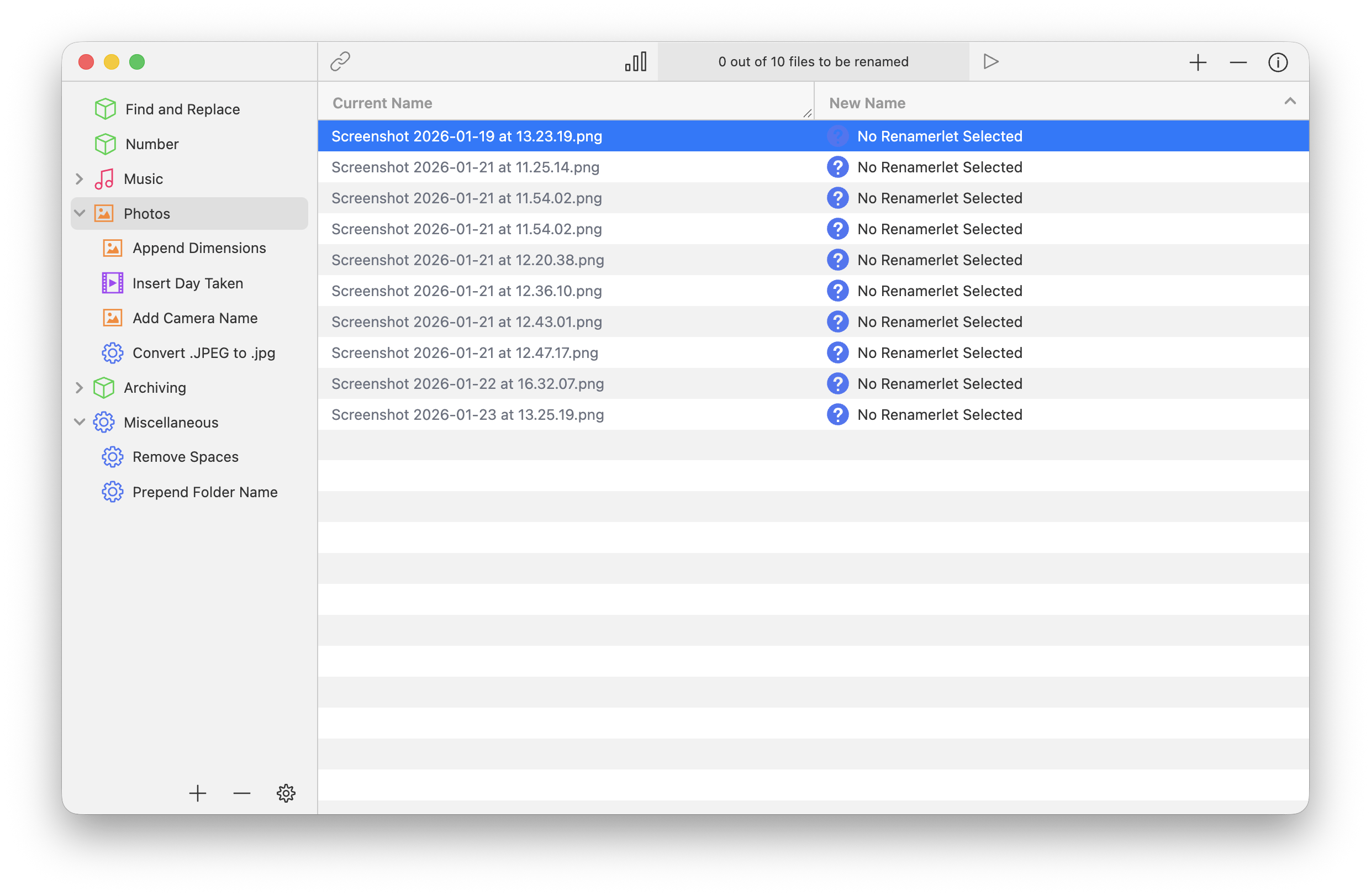
How to rename multiple files at once with different names
I’ve also been using Keep It Shot to rename multiple files for quite some time, and it’s a game-changer. With just two clicks, I can rename large batches of files and track my progress with a handy progress bar.
The app uses AI to analyze my screenshots and generate meaningful names, making it easier to search and file them.
I can also define tailored renaming preferences and automate the renaming of new screenshots. For example, I’ve set the app to rename all screenshots I take, giving them a meaningful name and adding a hyphen between words. “Screenshot 2025-11-28 at 14.04.39” becomes “preferences-rename-files.
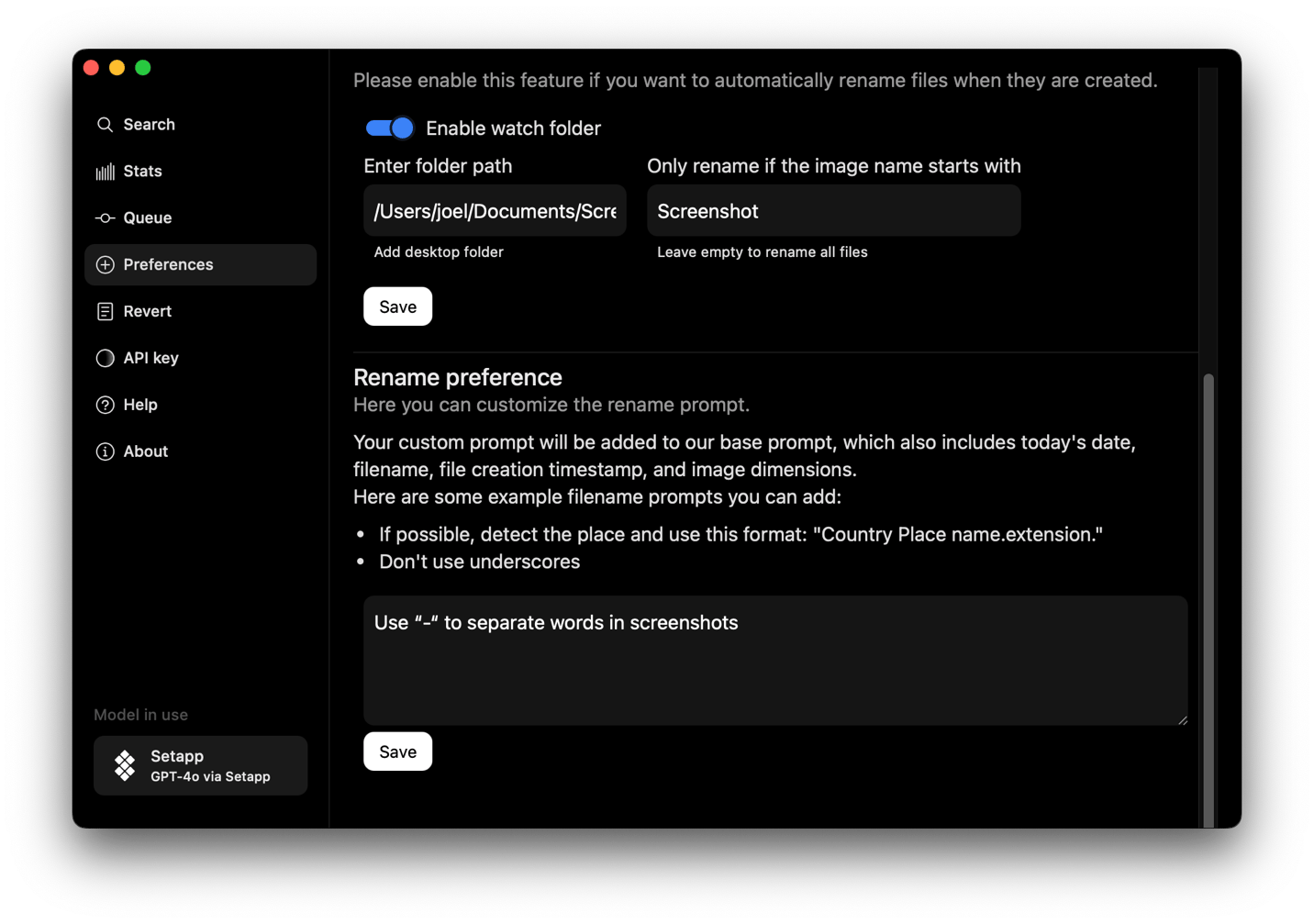
If I don’t like the new names, I can easily revert to the original names with a single click. This flexibility and efficiency have made organizing my files so much easier.
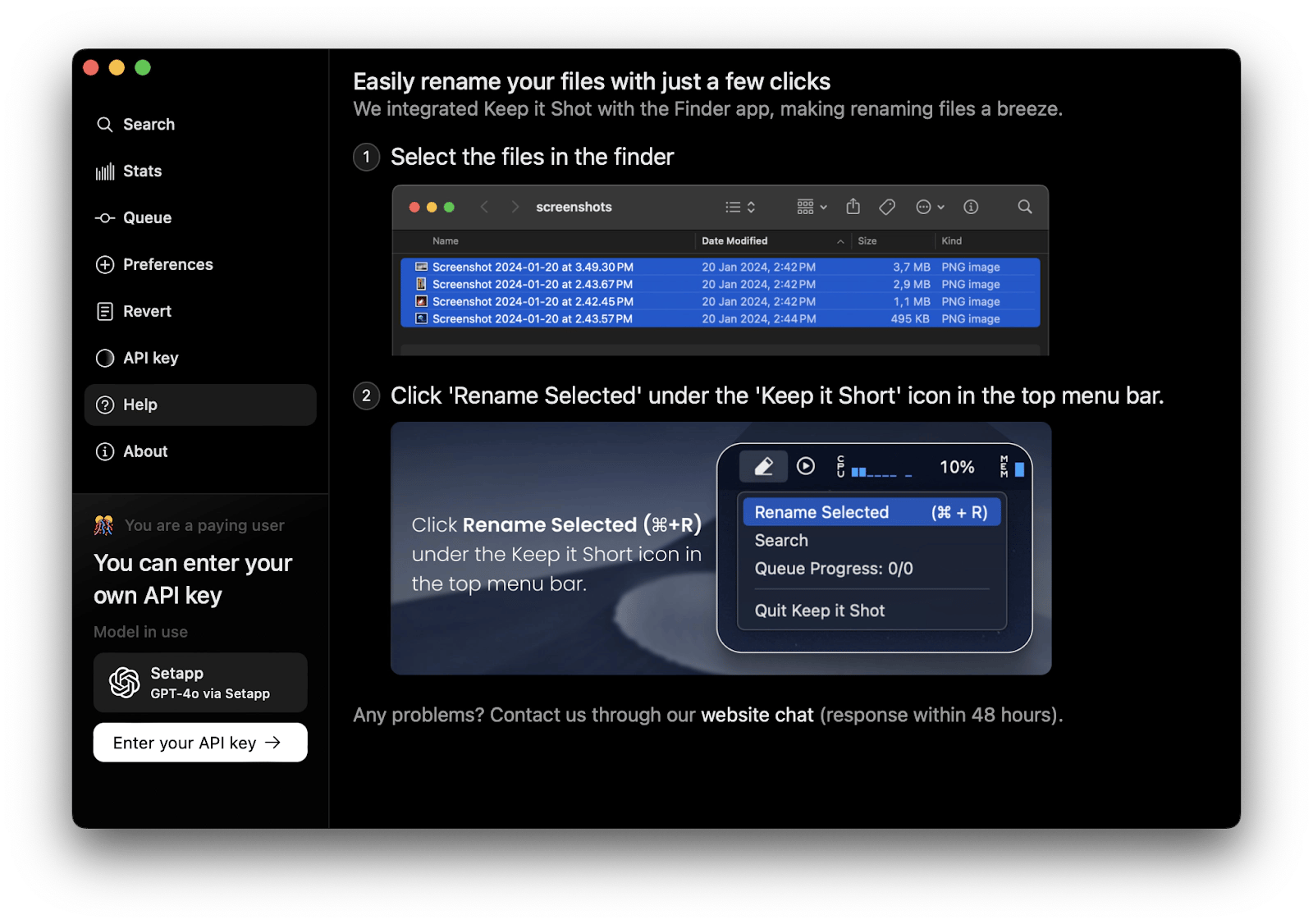
I also use Squash. The app has a simple batch renaming tool. Plus, it helps me deal with a number of other small tasks, such as compressing, resizing, or adding watermarks to my photos. Overall, it’s a universal batch image processor.
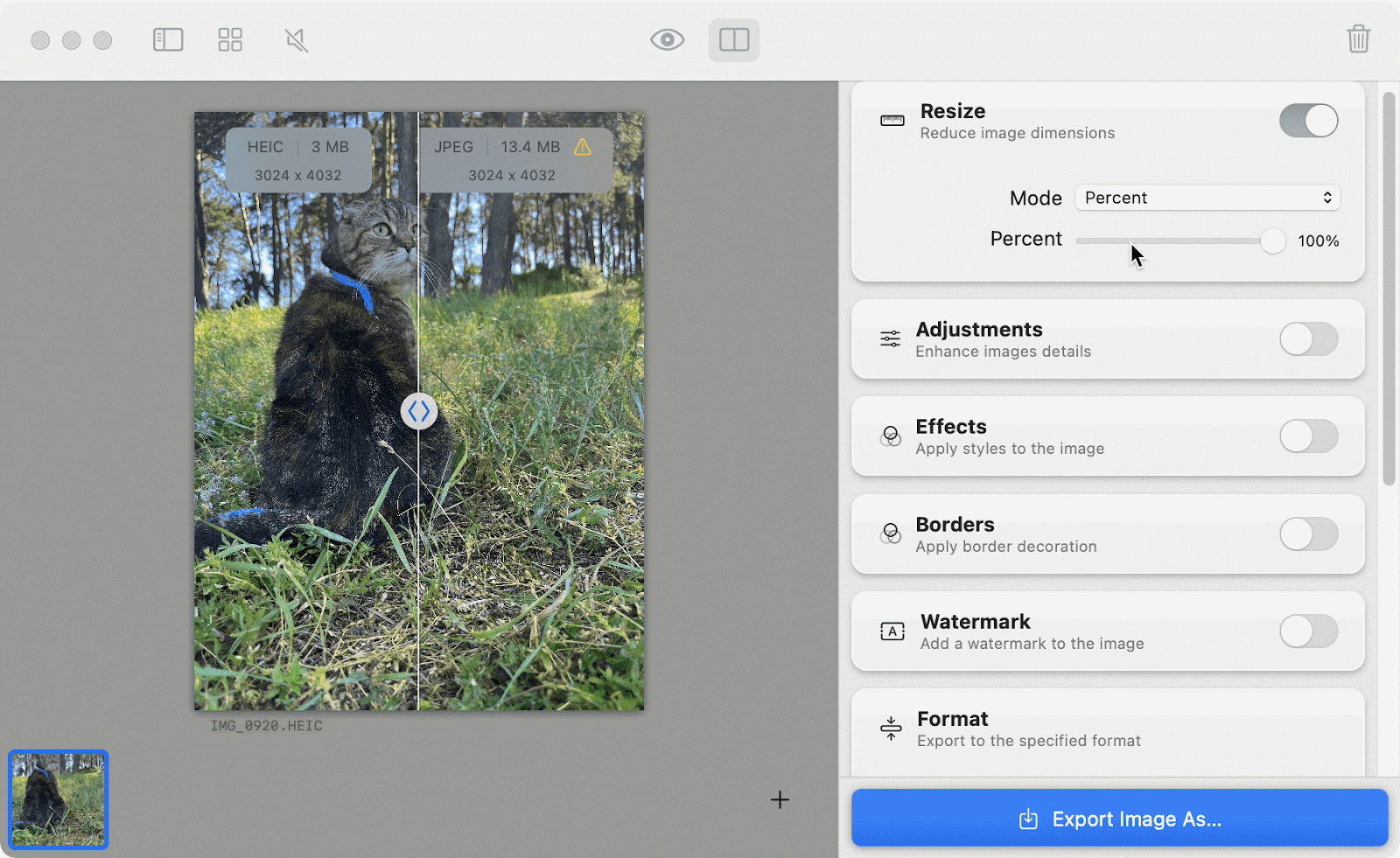
How to rename multiple files in Finder
It’s possible to edit multiple file names at the same time using a simple Finder window. Here’s how to do that:
- Open Finder on your Mac
- Find the files you are looking to rename
- Use Shift-click to select a batch of files
- Click the three-dots icon at the top of the Finder window
- Click Rename
- Select Format (the third option in the Rename toolbar)
- Here you need to select a Name Format for your file renaming. You can choose from Name and Index, Name and Counter, and Name and Date.
- In the Custom Format box, enter the new name that will be included in all of the selected files
- Enter a number in the “Start numbers at” box. It could be 1, but it doesn’t have to be.
- Click Rename.
As a result, all of the selected files will be renamed with the title you entered in the Name Format box plus a sequential number beginning with the digit in the “Start numbers at” field.
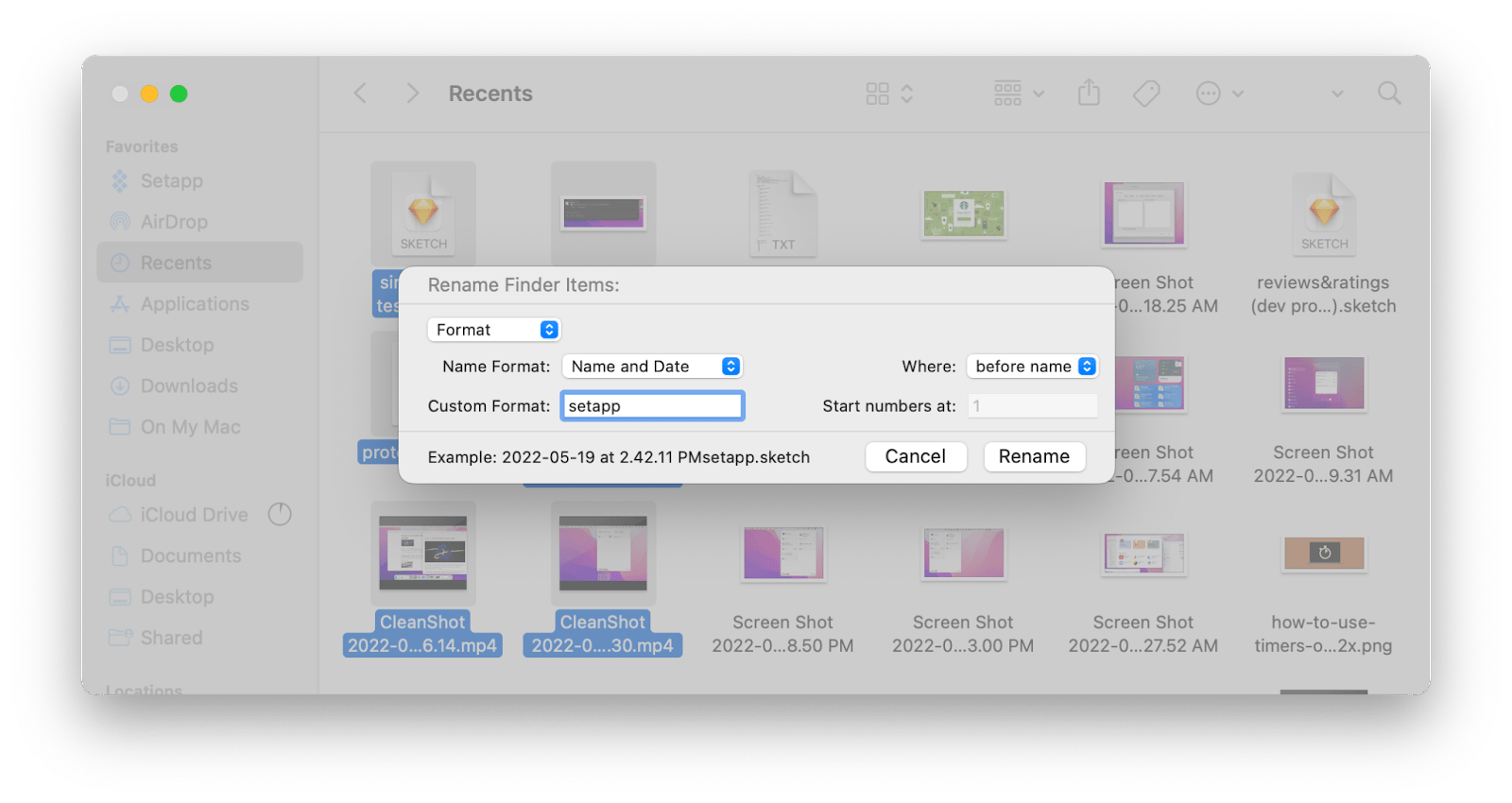
If you want to make it even easier to carry out specific Finder tasks, you can check out our Finder tips article.
How to add text while bulk renaming files on Mac
Sometimes the file names in question are fine as they are — they just need an extra identifier to be properly distinguished.
Here’s how to rename multiple files on Mac to add text:
Open Finder.
Locate the files.
Use Shift-click to select a batch of files
Click the three-dots icon > Rename
Select Add Text in the dropdown menu.
Type the text you’d like to add.
Choose whether to place it before or after the existing name.
Click Rename.
This option can help you organize and identify different files. For example, you can choose to add _Vacation2023 after all your vacation photos.
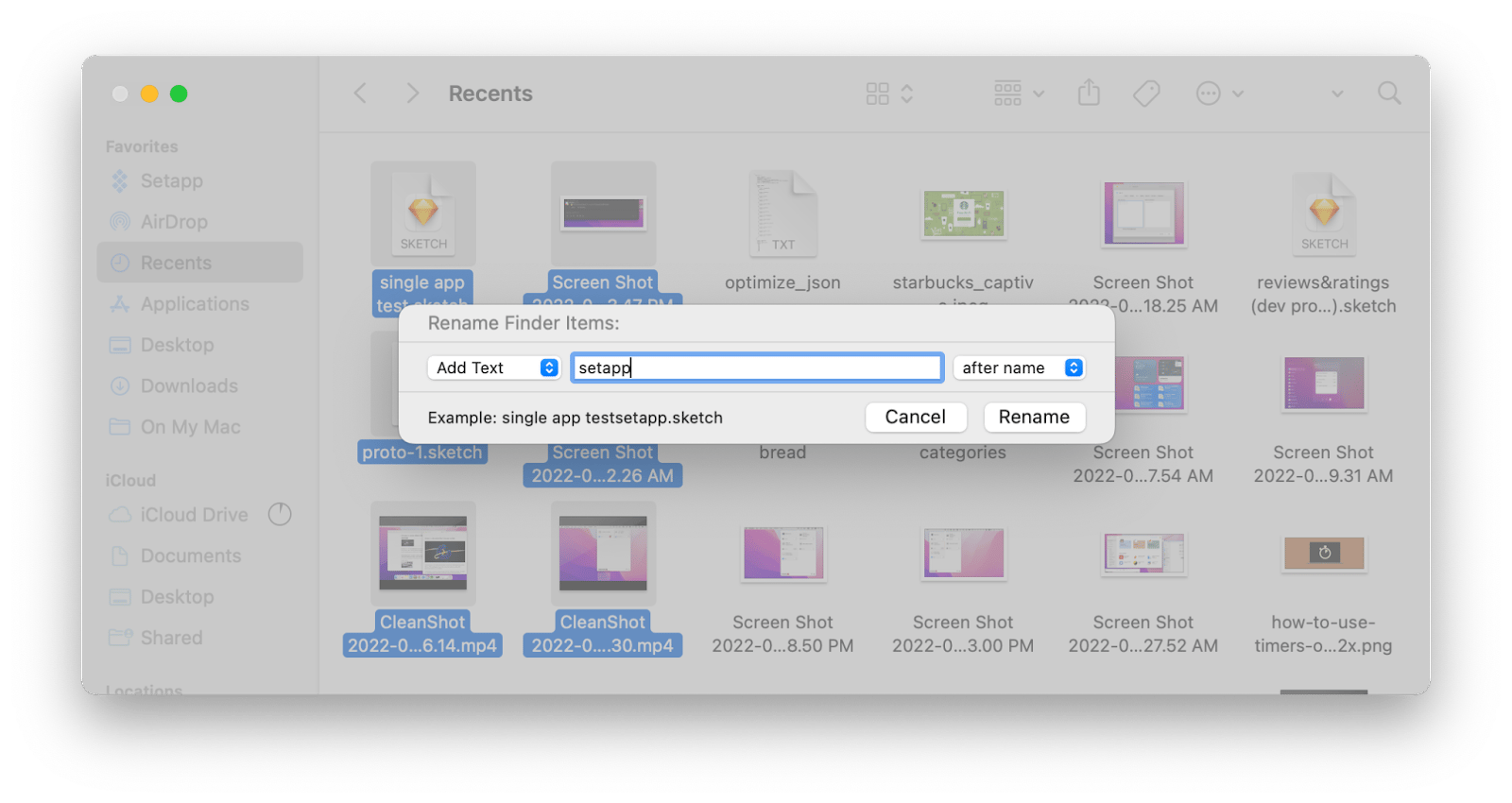
How to rename an open file
Since documents that are open or currently in use are locked from being edited, they can’t be renamed through the Finder function or by selecting Get Info or hitting Return when the file is selected. It’s a hassle to close down a document you’re working on just to rename the file — but if you don’t, you’re likely to forget by the time you’re done with it.
One quick hack for renaming an open document is to simply save it again with a new name:
- Go to File > Save As
- Enter a new file name and choose a new location if you’d like to
- Click Save.
The document name has now been changed to its new name, and all new saves will be done there. Remember to delete the old document copy with the original name.
How to undo a batch-rename of files on Mac
If you use Renamer, you can undo the latest batch-rename easily:
- Choose Edit in the app’s menu
- Choose ‘Undo Rename Files’
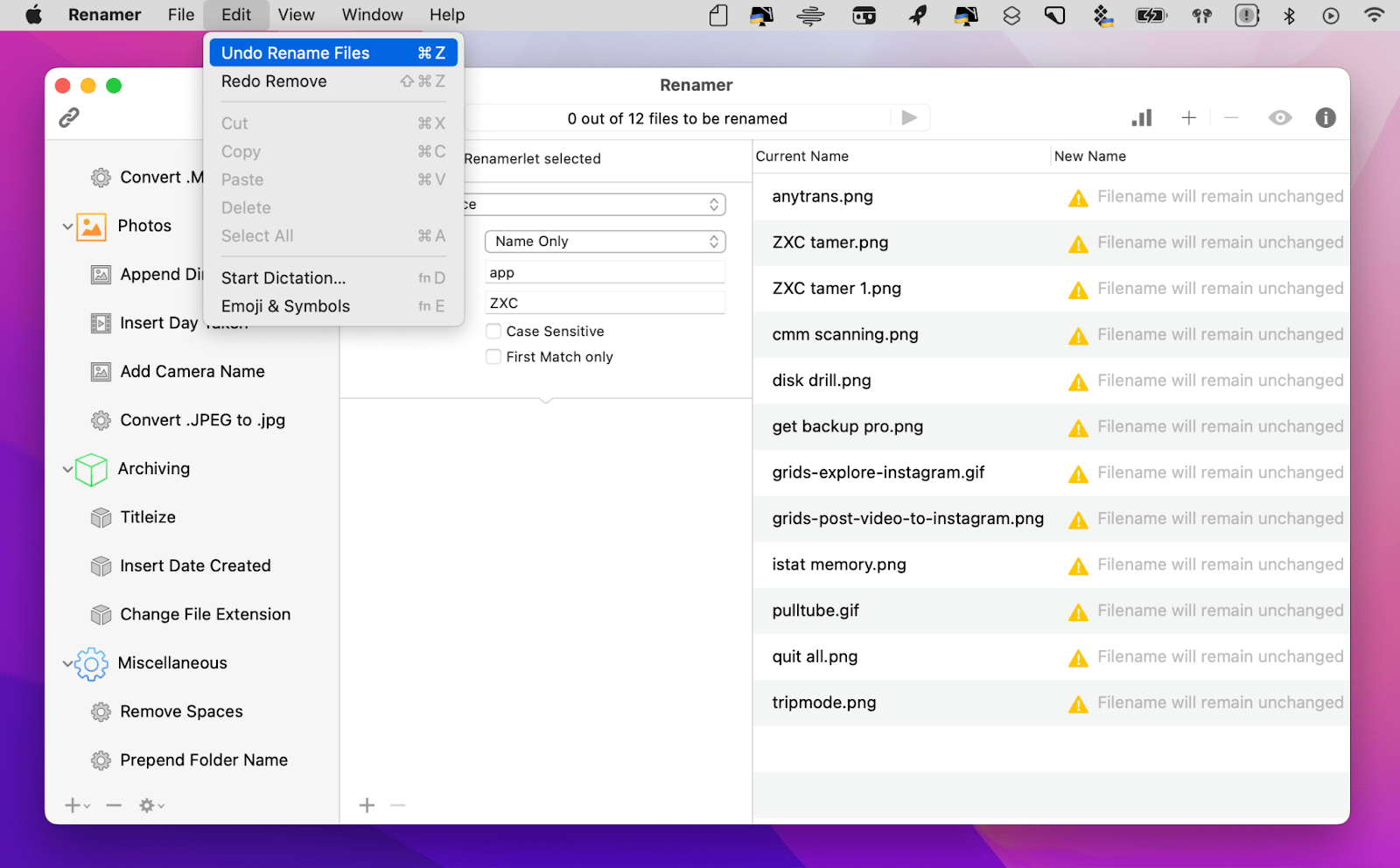
The same goes for Finder. If you’ve just recently renamed a batch of files and want to undo that action, go to Edit > Undo Rename (alternatively, press Command + Z). However, since Finder only allows you to undo recent actions, you won’t be able to undo a batch-rename if you ran any other action in Finder after you had renamed files.
How to replace and search certain words in files on Mac
It’s easy when you know which files to rename, but what if you don’t? If you have a huge pack of photos, for example, and need to rename just a dozen of them, don’t think about manually hand-picking the right photos; there’s an easier way.
Create a Renamerlet in Renamer for searching and replacing words in files:
- Click the plus button in Renamer’s toolbar to add a new Renamerlet
- Name your Renamerlet and choose the action — Find & Replace
- Customize other things, such as whether to apply changes to the name only or name & extension; select or deselect Case Sensitive, etc.
- Type the words or characters you want to replace, then the words or characters you want to replace them with
- Drag and drop your files, then run the Renamerlet.
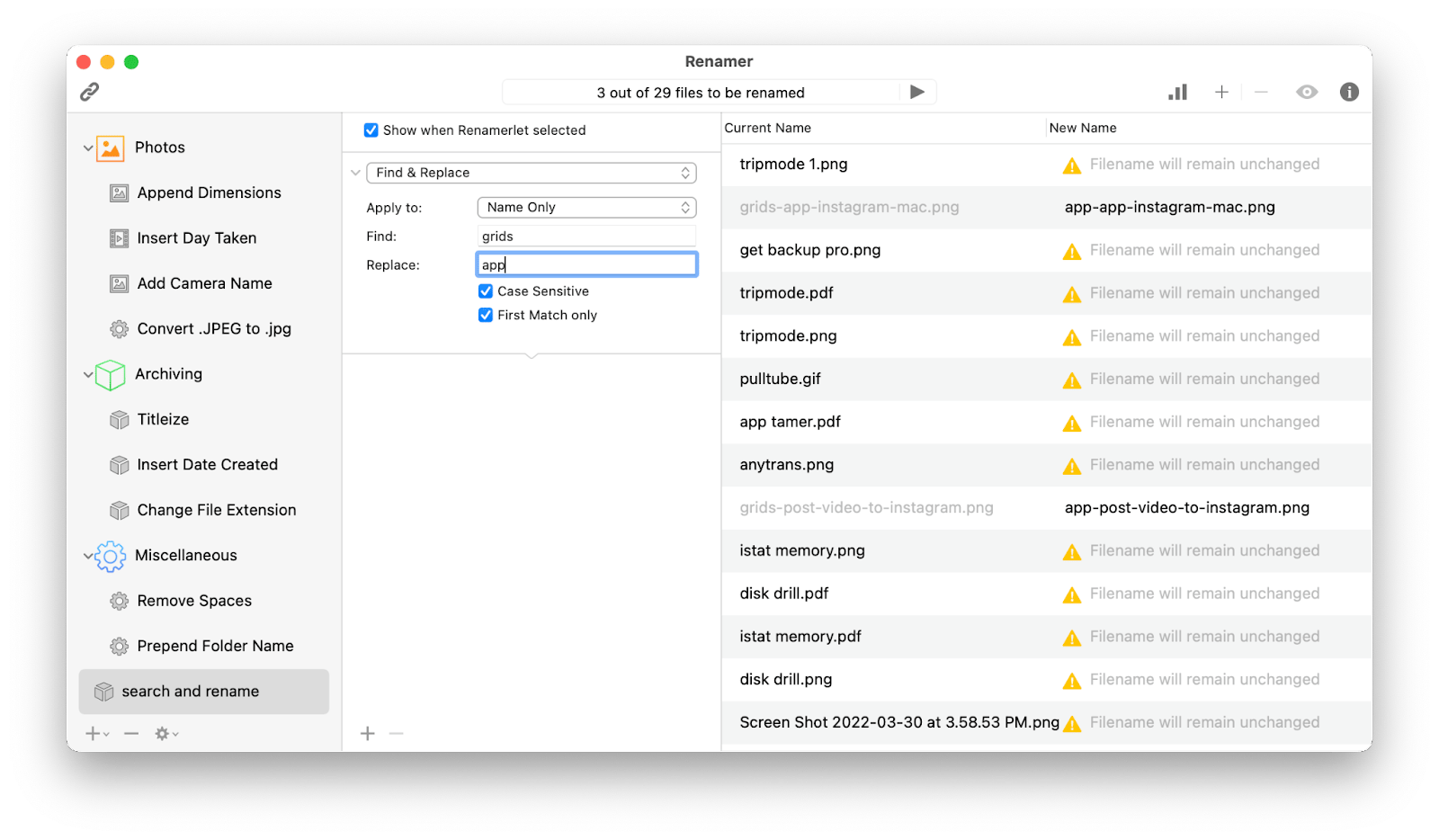
If you use Finder to batch rename files, here’s how you can find and replace words in file names:
- Locate a folder that contains the files you need to rename in Finder
- Shift-click to select all files
- Click the three-dots icon on top of Finder’s window
- Choose Rename > Replace Text
- Type the words or characters you want to replace, then the words or characters you want to replace them with
- Click Rename.
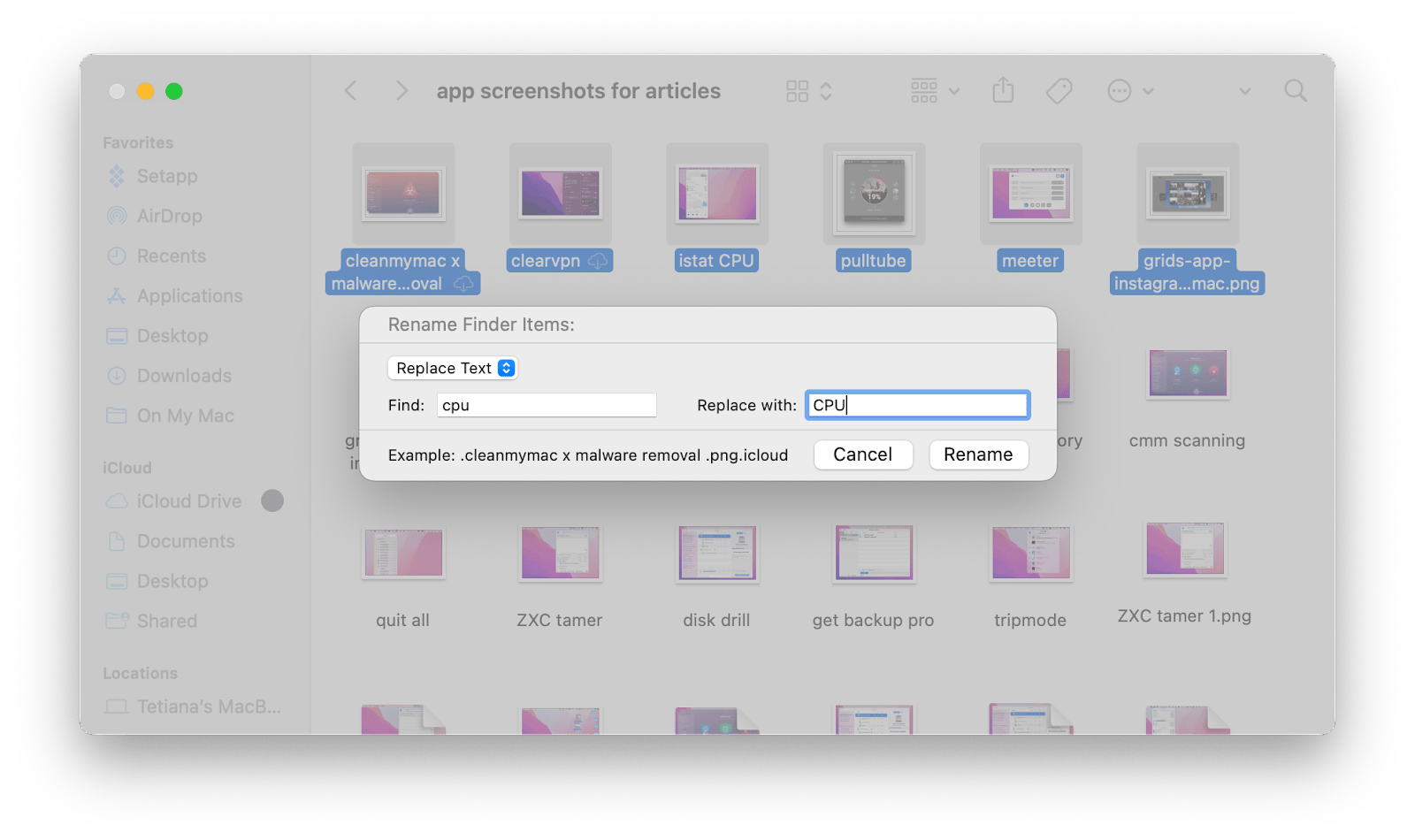
Summing up: How to mass rename files
Renaming multiple files on macOS used to be a real hassle for me. But after researching and testing various tools, I found the best solutions:
- Renamer: Gives full control with features like adding text, numbering files, and creating custom patterns.
- Keep It Shot: AI-powered tool that generates meaningful names and renames in just two clicks.
- Squash: Handles batch renaming, compressing, resizing, and adding watermarks to images.
I got all these apps on Setapp. The other app I mentioned, CleanMyMac, helps keep my Mac clean and is also available there. Setapp offers a 7-day free trial with access to over 250+ apps. I use it for so many things — editing photos, listening to music, writing with AI, and more. It has truly transformed how I manage tasks on my Mac. Give it a try.
FAQ
How do I bulk rename files on Mac?
You can bulk rename files on Mac using apps like Renamer, Keep It Shot, Squash, or Finder. On Finder, select the files and click the three-dots icon > Rename > Format. It’s built-in and easy to use, but apps like Renamer and Keep It Shot let you create custom patterns. You can even set them to automate the renaming process when you create a file.
Can I rename multiple files on Mac without extra software?
Yes, you can rename multiple files on a Mac without additional apps. Finder lets you do that by simply shift-clicking to select the files and right-clicking > Rename. You’ll be able to choose a format, add text, and replace text.
How do I rename files on Mac with AI assistance?
You can rename files on Mac using AI through Keep It Shot. The app is quite good at identifying the content of your file and then renaming it accordingly. You can even set your own rules to determine the format it will follow when doing it.
How do I undo a batch rename on Mac?
You can undo a batch rename you did via Renamer by going to Edit > Undo Rename Files. On Finder, you’ll need to press Command + Z immediately, but this may not be possible if you’ve already done other tasks.





